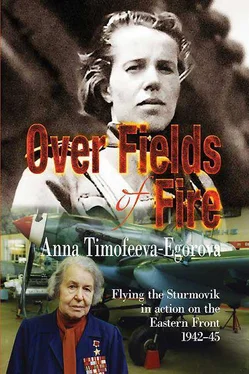But our foreman settled the argument:
“She’s wiry, she can take it. Let her join!” he concluded and gave me a reference.
Now I would have to go before a medical commission, and not just one but two. We had many qualms: we were spooked about certain twists and pitfalls supposedly invented by the doctors for those wanting to fly. But I was pleased to find no twists or pitfalls during the commission. Ordinary doctors in ordinary offices listened to our chests while tapping them, spun us in a special armchair to test our inner ears and if there were no shortcomings wrote: “Fit”.
To tell the truth, only 12 out of 20 came for a second examination, but it all came out well for me. The doctors all wrote the one most wonderful word in the whole Russian language — “fit”. Now only the credentials committee was left.
And then one day, having finished night shift in the shaft I had a shower, changed clothes, had breakfast in the shaft canteen and went to the credentials commission. It was situated in a former church in Yakovlevskiy Lane near the Kursk train station. Now there were classrooms and aeroclub offices here. They didn’t call me up for quite a while and I (after all it was after night shift!) fell asleep sitting on a wooden bench. But as soon as I heard my surname I jumped up and not yet fully awake, rushed into the office. I was supposed to appear before the high commission in a military manner and report according to all regulations, but all I said was:
“It’s me, Anya 23 23 Translator’s note — another diminutive for Anna.
Egorova, from shaft 21.”
All those sitting at the large table burst out laughing together. The stream of questions was endlessly long: I was asked about my parents, brothers, sisters, my work, and on geography…
“Determine the longitude and latitude of the city of Moscow”, I remember someone from the meticulous commission suggesting.
I approached a map hanging on the wall, then for quite a while I led my finger along the meridians and parallels and finally gave the answer. Everyone laughed again: it turned out that I had confused longitude and latitude.
“She’s just flustered”, a Comsomol representative put in. “She’s a crack worker.”
“Well, if she’s a crack worker…” An airman drawled. “Tell us, girl, which group exactly do you wish to join?”
I understood I had to stop “bleating”, and pull myself together, and start talking properly, sensibly — otherwise everything would be ruined: they’d throw me out and never call me back. I gave the deepest sigh and said “I want to be a pilot!”
“Ooh, what a smarty she is, and the Comsomol swore she was flustered. Not just anywhere, but straight to flying!”
Someone growled from behind the table “It’s a bit soon, she’s the wrong age, she should wait another year.”
How extraordinary: they wouldn’t take me as a gold seamstress because of my age, wanted to kick me out of the shaft because of my age… And the same again when I fraudulently added two years to my age, again I wasn’t good enough because of my age?
“For the time being you’ll be on a glider…”
“And what’s that?”
“You don’t know? Strange… It’s a flying machine. Well, how can I explain it to you more simply: it’s a plane with no engine…”
“So that means that I’ve been dreaming of an engine in vain?” burst out from me. I approached the table and began to talk very fast, addressing really only the airman:
“Gliders are for gliding, a plane is what I need… Please understand — I long to fly…”
“This year gliders are what you’ll fly, if you like it we’ll transfer you to an airplane group. Next!”
Shutting the door behind me I collapsed on a chair kindly moved up by someone. Questions poured on me from all sides: “How was it in there?”, “Where are they sending you?”, “Are the questions hard?”
We studied theory all winter. It was hard to combine work and studying at the workers’ faculty and in the aeroclub. But Tosya and I even managed to go to movies and sometimes even dancing. Our shaft was under the patronage of the Theatre of Operetta and we were often provided with tickets to shows. The actor Mikhail Kachalov was our idol and I even fell in love with him, trying to attend performances he acted in and to sit as close to the stage as possible.
In early spring we began to go to Kolomenskoye village for practice. It was said that this was where a serf called Nikitka, having made wings for himself, jumped from a high bell-tower. We would take off from a high bank of the Moscow river and hover on our gliders. Of course, by today’s standards everything was done in a very primitive way. The US-4 glider was set up on the steep bank and anchored with a steel rod. The trainee would sit in the cockpit and the others would go down the slope, take hold of the ends of the elastic straps attached to the glider and at the instructor’s command “Pu-u-ull!” stretch them out so as to shoot the one sitting in the glider cockpit as if from a slingshot.
In order to stay in the air for 2 or 3 minutes and spend the rest of time pulling on the gliders’ elastic straps, having worked a shift in the shaft, all summer I would go to Kolomenskoye every day. By autumn in the pit, by now an inclined shaft, the congenial smell of warm moisture, paint and lacquer reached our nostrils. The smell of finishing works, a sure sign that the whole job was close to an end awoke a pleasant feeling in our breasts. The sensation of something festive and thrilling accompanied us when we walked on the almost ready station platform. But the walls were still bare and heavy crates with electric equipment were still being carried down one after another. We, yesterday’s fitters, were now busy with revetment — it was a common practice for the Metro of that time. People wanted to build the Metro from start to finish and would master several interrelated trades…
In October 1934 a test train of two red wagons rode the Metro. What an exultation that was! We shouted “hurray!”, sang songs, hugged, danced, ran after the wagons. My first ride in a Metro train left an indelible impression on me. It was such a big deal underground on 6 February 1935 when the builders did a ‘fly-by’ of all their 13 stations! And on 15 May 1935 the Metro was open for public use. The Moscow Comsomol organisation was awarded the highest Government decoration, the Order of Lenin, and a big group of the Metro builders was also awarded with orders and medals. For us the Metrostroy had become a great school of fortitude, character building and tempering.
“You’ve done enough digging in the ground, it’s time to come to your senses. Go study if you want but in the meantime I’ve made an arrangement — you’ll work in the editorial office of the Trud 24 24 Translator’s note — ‘Labour’.
newspaper. The position is nothing special but you’ll be among clever and educated people. Hopefully they will influence your partisan personality.”
So my brother declared, and took me to the Palace of Labour, to Solyanka Street, where the editorial office was located. And I began to read letters from rabkors 25 25 Translator’s note — abbreviation of ‘ rabochiy correspondent’ or working correspondent — a correspondent who worked at industrial operations.
deciding to which department they should be delivered. The work was interesting but I missed the Metrostroy’s enthusiastic people. That was why, after four months of ‘torment’ at the Trud , I fled to take part in the construction of the second stage of the Metrostroy , to the ‘Dynamo’ shaft 84-85. Now I started work as a rock-breaker and rock-drill repair mechanic, and at the same time as a voluntary librarian in the shaft’s trade union committee. I had already graduated from the workers’ faculty and the glider school — I had got my secondary education, becoming a gliding instructor.
Читать дальше












